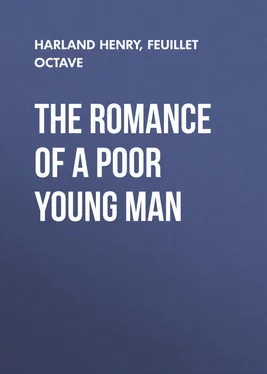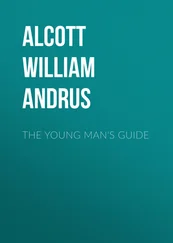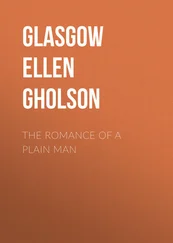Henry Harland - The Romance of a Poor Young Man
Здесь есть возможность читать онлайн «Henry Harland - The Romance of a Poor Young Man» — ознакомительный отрывок электронной книги совершенно бесплатно, а после прочтения отрывка купить полную версию. В некоторых случаях можно слушать аудио, скачать через торрент в формате fb2 и присутствует краткое содержание. Жанр: foreign_antique, foreign_prose, на английском языке. Описание произведения, (предисловие) а так же отзывы посетителей доступны на портале библиотеки ЛибКат.
- Название:The Romance of a Poor Young Man
- Автор:
- Жанр:
- Год:неизвестен
- ISBN:нет данных
- Рейтинг книги:5 / 5. Голосов: 1
-
Избранное:Добавить в избранное
- Отзывы:
-
Ваша оценка:
- 100
- 1
- 2
- 3
- 4
- 5
The Romance of a Poor Young Man: краткое содержание, описание и аннотация
Предлагаем к чтению аннотацию, описание, краткое содержание или предисловие (зависит от того, что написал сам автор книги «The Romance of a Poor Young Man»). Если вы не нашли необходимую информацию о книге — напишите в комментариях, мы постараемся отыскать её.
The Romance of a Poor Young Man — читать онлайн ознакомительный отрывок
Ниже представлен текст книги, разбитый по страницам. Система сохранения места последней прочитанной страницы, позволяет с удобством читать онлайн бесплатно книгу «The Romance of a Poor Young Man», без необходимости каждый раз заново искать на чём Вы остановились. Поставьте закладку, и сможете в любой момент перейти на страницу, на которой закончили чтение.
Интервал:
Закладка:
Charmingly serious himself, Feuillet's heroines likewise are always serious, in their different charming ways. They may be wilful and capricious, like Marguerite Laroque, or fond of the excitements of the world, like Mme. de Rias, or wise in their generation, like Mme. de la Veyle, but they are always womanly and human at the red-ripe of the heart, and they are almost always religious. A sceptic, scepticlike, Feuillet utterly discountenances scepticism in woman. Even his most recusant of masculine unbelievers, the Vicomte de Vaudricourt, proclaims his preference for a pious wife. "Not, of course," he says, "that I exaggerate the moral guarantees offered by piety, or that I mistake it for a synonym of virtue. But still it is certain that with women the idea of duty is rarely dissociated from religious ideas. Because religion doesn't keep all of them straight, it is an error to conclude that it keeps none of them straight; and it's always well to be on the safe side." Elsewhere Feuillet gives us his notion of the moral outlook of the woman who is not religious. Evil for her, he tells us, ceases to be evil, and becomes simply inconvenance . 'Tis a very mannish, a very Frenchmannish, way of viewing the thing.
One has sometimes heard it maintained that only women can reveal themselves with perfect grace in a form so intimate as letters or a diary; that a man's hand is apt to be too heavy, his manner too self-conscious. Perhaps it is Feuillet's sympathy with women that has made him the dab he is at this womanly art. In La Morte , for instance, we learn vastly more of Bernard's character from his diary than we should from thrice the number of pages of third-personal exposition. The letters from Marie to her mother, in Monsieur de Camors , furnish the single element of relief in that lugubrious composition. Even those that pass between Rias and Mme. de Lorris, in Un Mariage dans le Monde – though their subject-matter is sufficiently depressing, though the man is an egotistical cad, and the great lady who is giving him her help and pity ought rather to despise and spurn him – are exceedingly good and natural letters; and the letter from Mme. de Rias to Kévern, which ends the book, is a very jewel of a letter. But it is in the diary of his poor young man that Feuillet's command of the first person singular attains its most completely satisfying results.
Le Roman d'un Jeune Homme Pauvre is a tale of youth, for the young; and the eldest of us may count himself still young if he can still enjoy it. Here we have romance pure and simple, a thing of glamour all compact; and the danger-line that so definitely separates romance from absurdity, yet leaves them so perilously near together, is never crossed. The action passes in the country, and in the most delectable sort of country at that – the country of the appreciative and imaginative cit. Before all things a Parisian, Feuillet is never particularly happy in presenting Paris. His Paris is correct enough in architecture and topography, no doubt; but the spirit of Paris, the whatever it is which makes Paris Paris, and not merely a large town, somehow evades him. Possibly he knew his Paris too well; familiarity had bred a kind of inability to see, to focus, a kind of "staleness." Anyhow, it is when he gets away from Paris that he wakes to the opportuneness and the opportunities of scenic backgrounds. His eye, "stale" to town, is now all eagerness, all freshness. Impressions of beauty crowd upon him. He sees the country as it is doubtful whether the countryman ever sees it – the countryman who has been surfeited with it, who has long since forgotten its first magical effect. He brings to the country the sensitiveness which is the product of the city's heat and strife. Dew and wild flowers, the green of grass and trees, the music of birds, the flutter of their wings, the pure air, the wide prospects, the changing lights – it is to the appreciative and imaginative townsman that these speak their finest message.
But Feuillet is more than a townsman: he is a teller of fairy-tales. To him the country is a free playground for his fancy. There beautiful ladies and gallant knights have nothing to do but to love and to sing; and there, without destroying our illusion, he can leave them to live happily forever after. The Brittany, in which Maxime and Marguerite meet and misunderstand and woo and wed, is not that northwestern corner of France that one can reach in a few hours by steamer from Southampton; it is a Brittany of fairy woods and streams and castles, that never was, save in the poet's dream. For if others of Feuillet's novels have been only in part fairy-tales, or only rather like fairy-tales, the Romance of a Poor Young Man is a fairy-tale wholly and absolutely. The personages of the story are the invariable personages of the fairy-tale: the prince disguised as a wood-cutter, in the Marquis de Champcey disguised as a farm-bailiff; the haughty princess, who will not love, yet loves despite her will, and is rewarded by the wood-cutter's appearing in all the prince's splendour at the proper time, in Marguerite Laroque; the bad prince and the bad princess, in M. de Bévallon and Mlle. Hélouin; the good magician, in M. Laubépin; and the delightfullest of conceivable fairy godmothers, in Mlle. de Porhoët. And the progress of the story is the wonted progress of the fairy-tale. There is hardship, but it is overcome; there are perils, but they are turned; misconceptions, but they are cleared up. There are empty pockets, but there is the bag of gold waiting to fill them. The marvellous never shocks our credulity, the longest-armed coincidences seem the most natural happenings in the world. We are not in the least surprised when, at the right moment, the bag of gold appears at Maxime's feet, enabling him to marry; it is the foregone consequence of his having a fairy godmother. We don't even raise the eyebrow of doubt when the Laroques contemplate relinquishing their fortune to the poor, so that Marguerite may come to her lover empty-handed; that is the accepted device of the fairy-tale for administering to the proud princess her well-deserved humiliation. In one small detail only does the fairy-tale teller lose himself, and let the novelist supplant him; that is where he implies that the bad prince and princess, after their wicked wiles had been discovered, took the train to Paris. They did nothing of the sort. They were turned into blocks of stone, and condemned to look on at the happiness of the good prince and princess from the terrace of the Château de Laroque.
But it must not be supposed, because the personages of the Romance of a Poor Young Man are fairy-tale personages, that therefore they are not human personages. It is, on the contrary, the humanity of its personages that makes your fairy-tale interesting. You stick to human men and women, you merely more or less improve the conditions of their existence, you merely revise and amend a little the laws of the external universe – an easy thing to do, in spite of the unthinking people who prate of those laws as immutable. Then the fun consists in seeing how human nature will persist and react. Surely none of Feuillet's heroines is more engagingly human than Marguerite Laroque. It is true that we see her only through the eyes of a chronicler who happens to be infatuated with her, but we know what discount to allow for that. We are confident from her first entrance that if, as we hope, our poor young man's head is screwed on as poor young men's heads should be, Marguerite will turn it. We learn that she is capricious, therefore Maxime will be constant; that she is proud, therefore, in all humility, he will be prouder; that she is humble, therefore, in all pride, he will humble himself at her feet. But antecedent to all this, and just because his ostensible business in Brittany is the management of the Laroques' estate, no one needs to warn us that his real business will be the conquest of the Laroques' daughter. We can foresee with half an eye that the affairs of the estate are affairs which our disguised marquis will conscientiously neglect. Indeed, Mme. Laroque herself seems to have been haunted by something of the same premonition. What does she say to the sous-préfet? "Mon Dieu, ne m'en parlez pas; il-y-a là un mystère inconcevable. Nous pensons que c'est quelque prince déguisé… Entre nous, mon cher sous-préfet, je crois bien que c'est un très-mauvais intendant, mais vraiment c'est un homme très-agréable."
Читать дальшеИнтервал:
Закладка:
Похожие книги на «The Romance of a Poor Young Man»
Представляем Вашему вниманию похожие книги на «The Romance of a Poor Young Man» списком для выбора. Мы отобрали схожую по названию и смыслу литературу в надежде предоставить читателям больше вариантов отыскать новые, интересные, ещё непрочитанные произведения.
Обсуждение, отзывы о книге «The Romance of a Poor Young Man» и просто собственные мнения читателей. Оставьте ваши комментарии, напишите, что Вы думаете о произведении, его смысле или главных героях. Укажите что конкретно понравилось, а что нет, и почему Вы так считаете.












